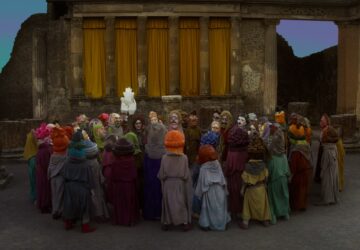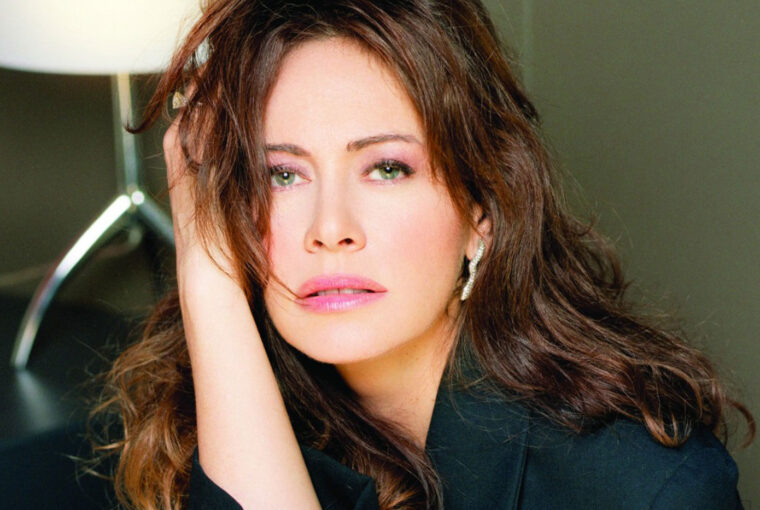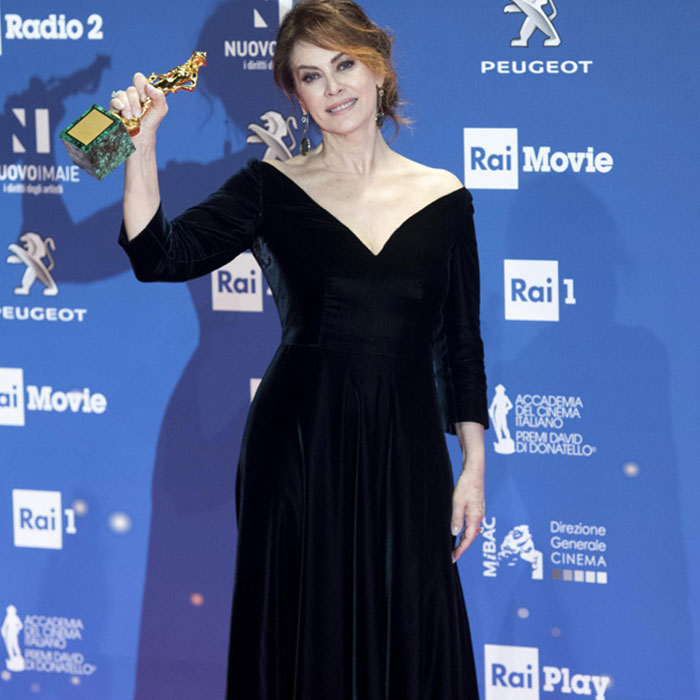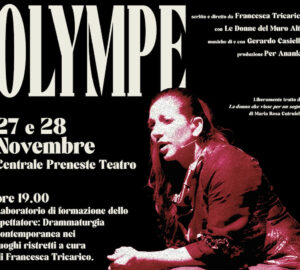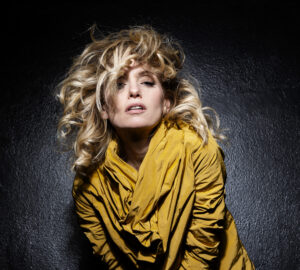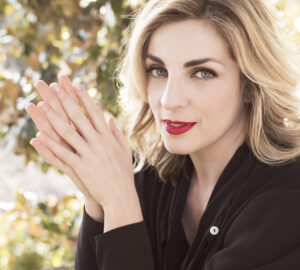ELENA SOFIA RICCI E LA SUA SETTIMA ARTE
Elena Sofia Ricci is a true champion of the seventh art, an excellence on the Italian scene. An intense, and charismatic actress, she made her passion for experimentation her style. This year she is the winner of the David di Donatello and of the Nastro d’Argento as best actress for the film Loro by Paolo Sorrentino and of the Flaiano Award as best theater actress of the season for Vetri Rotti by Arthur Miller, directed by Armando Pugliese.
by Umberto Garibaldi e Maria Rita Marigliani

Almost 40 years of life spent on sets, how did you change in these years and how did your acting change?
Whether we like it or not, years pass and I changed. I prefer me now, although sometimes I recognize me in the character played by Antonio Banderas in the beautiful film Dolor y Gloria by Almodovar, I haven’t the body of a girl anymore. But the passion for my job remained unchanged over time and from the creative point of view I still feel like when I was thirty. As for my acting, I tried to study as much as possible in these years, maintaining my desire to stay up. Especially in the theater I try to compare myself with the great classics that inevitably impose a continuous confrontation with the author. I am a perfectionist and I work on the deepening and on the investigation of the soul of the characters I play, whether they are fictional or real as happened for Francesca Morvillo and Veronica Lario. I do everything to try to “interpret” a character and not “play it”. I believe there is a profound difference.
Is there a role that you miss it and would you like to do?
There are so many roles that I would like to interpret and that I miss. Someone is already in my plans, others have to come. I always want to feel like a girl who still has a lot to say.
In your work, is there anything that scares you?
I’m not scare to grow old: when I was young, I couldn’t wait to get older to play those mature roles that allowed me to stage a woman with more experience and so much life lived, so that I could go deeper. From my debut in 1980 to the present day, I got rich in experiences that allow me to bring more emotions into the scene simultaneously. What scares me instead is the disease; a disease that might not allow me to do my job anymore. I’m in love with my job and it would be a huge pain for me to give it up. I express myself through it. Obviously the fear that relationships can be compromised by an illness scares me even compared to my family. I would like to die on stage like Molière. Working for me is like breathing. I have been performing since I was a child, even simply in the living room. It’s my life.
Is acting a way to escape reality?
Acting, for me, is a way to deepen the reality, to make a journey inside the Dante’s hell, of the human soul. In that hell there is always something that concerns us all. We can recognize ourselves in characters like the Ignota of Pirandello, in the women of Tennessee Williams, in the Zia of Mine Vaganti, in Suor Angela of Che Dio ci aiuti, in Lucia of the Cesaroni… There is always something universal in which everyone we can recognize each other. Being an actress is my way to go and investigate that inner reality that otherwise we wouldn’t be able to see.
We are constantly in search of success and we are afraid of mistakes and failures. In your life, how did you relate to successes and how to mistakes?
Since I started my career, I have been very lucky. I’ve always worked and I’ve had so many awards. We actors are fragile. I like to remember my friend Ennio Fantastichini who told me: “we artists, we are all united by a common trait… the hunger for love”. We need the applause of the public: for us it is an embrace, a caress, a way to fill an affective chasm that we carry within. When I was a girl, if I didn’t like, I suffered. Then with time, with analysis, I learned that we don’t have to please everyone. I stopped looking for general consensus, I relaxed and obviously things are better now! As a mother, I try to work with my daughters on the ability to overcome and manage frustrations. Today the boys find it difficult to accept them and it is our duty to help them to strengthen from this point of view. When I was a girl, there was everything to build, there was much more hope in the future. Today, however, young people live in a world where there is no space, where little can be built because everything has already been built. It is difficult to find a job, but also to identify a passion to be able to live by it. Our boys are unmotivated. They tend to be used to want everything at once, without commitment and effort. It is difficult to make our children understand that not is important, that we must learn to accept them. The future that awaits them is full of doors in face, we have also received them and we have a duty to teach them to react to all this and not to be beaten down.
Today, with the social networks the feedback with the public is immediate. How is your relationship with the internet?
I’m denied with social media, but luckily I have someone who takes care of it and shows me everything. I’m surprised by the affection and love of the fans. It’s rare for me to read negative comments about my account. But internet is a vast world, you can find everything. I have esteem for those who have managed to build a “new” profession through social networks. Sometimes, however, the reference model risks to be too high, perfect. Not all boys can go that far. I would like young people to be presented with alternative models… as normal boys who do something interesting. It would be nice, through social media, to make music of the past known, poetry, literature, it would be nice to have an incentive to work more on the essence of life and less on the appearance.
If you had the chance to change the past, is there something you wouldn’t do?
There’s probably something I wouldn’t do, but I don’t want to waste time concentrating trying to understand what. My past is the result of everything I have experienced and done. I wouldn’t be the person I am without all my past, even in the negative aspects. The painful experiences I have had in life have meant that I became the woman of today and the woman I’m today I likes her. (laughs, Edit).
You played many roles, which criterion do you use to accept a part?
When I read a script, a play I have to understand the character in front of me. I have to visualize that woman, how she moves, what she thinks, what she feels. I must have that woman in front of my eyes to focus on both my body and my soul, otherwise I am unable to interpret her. I must fall in love with her. Yes, I would say that there is a love relationship with the characters I play.
You are one of the very few actresses who is successful both on television and in the cinema, acting in fiction that became cult, without ever giving up your first great love: theater. Has the “Berlin Wall” that divided the cinema actors from the theater and television actors been demolished?
This year I didn’t expect to win the David, it seemed like a miracle to have been a candidate. I had a hard to imagine that the Academy of Italian cinema could vote for me, while on TV my Suor Angela raged with record ratings. And instead it happened. The David for me was a bit of an award for all the actors who can finally feel free to move from cinema, to theater, to TV without making too many problems. I struggled to be free to do what I liked. I’ve always got my hands dirty, the work is noble. If you work honestly then, work is sacred. I learned so much from everything I did. I brought my theatrical experience to the cinema and on TV. I brought my film and television experience to the theater. I fed on everything! Let me be honest, if any of us can fill the theaters today, he is also thanks to television and its viewers.
The dedication you gave during the David impressed us. Your prize was dedicated to your daughters and to young people: “discover your passion and try to make it coincide with your job”!
I was lucky. I started dancing when I was little and thanks to dance, music and painting that became my life companions, I grew up falling in love with art. Perhaps school and families could work more on the artistic and cultural proposal to show children. Even we actors, musicians, dancers, painters, sportsmen, scientists… we could put ourselves at the service of the schools to create a space that helps the boys to identify a passion. I think that we should work more on emotional intelligence, because by coming into contact with the deepest part of oneself, it will be easier to find one’s inclination.
Right now you are on the set of “Vivi e lascia vivere” by Pappi Corsicato. Can you anticipate something of your character?
People will have to expect an original, new, suspicious series. My character, Laura, is a different woman from all the ones I’ve played so far. Each of us will be able to recognize her. “Vivi e lascia vivere” is a series that encompasses many genres, it’s a family, but also a mystery, a thriller…
What are your next projects?
I’ll probably shoot a new TV movie. I am superstitious… I will talk to you in the coming months. From February, I will return with the beautiful theatrical project: “Vetri Rotti”. Miller wrote this text in 1994, as an octogenarian, dating back to 1938 when he was still a boy, one of those who did not realize what was happening in Europe and was superficial in considering his status as a Jew. This wonderful piece, Miller probably wrote it to deal with his past. In the text Miller says: “but why we care so much about what happens in Europe, in Germany? There is the ocean in the middle!”. In 1994, in the Balkans, the Yugoslav wars were taking place and there was a middle sea. Today a sea separates us from Syria, from Africa. In short, there is always a sea that divides us from some tragedy that is taking place elsewhere, which does not concern us. But is not so. It concerns everyone. Our political, human and individual consciences. Miller with his Vetri Rotti throws us into the sea of questions, to come to terms with our consciences. But he also speaks to us about
broken glass inside each of us, in the private, in the couple and in the deepest self. There are many levels of reading. Sylvia Gellburg, my character, is suddenly paralyzed and her paralysis is not just physical. It is the paralysis of one who is rendered impotent by fear.
